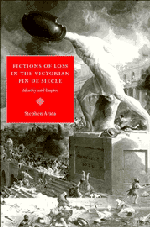Book contents
- Frontmatter
- Contents
- Acknowledgements
- Introduction: Decline and fall
- PART ONE STRANGE CASES, COMMON FATES
- PART TWO BETWEEN THE BODY AND HISTORY
- PART THREE THE SINS OF EMPIRE
- 5 The Occidental tourist: Stoker and reverse colonization
- 6 Strange events and extraordinary combinations: Sherlock Holmes and the pathology of everyday life
- 7 A universal foreignness: Kipling, race, and the great tradition
- Conclusion: Modernist empires and the rise of English
- Notes
- Index
5 - The Occidental tourist: Stoker and reverse colonization
Published online by Cambridge University Press: 10 May 2010
- Frontmatter
- Contents
- Acknowledgements
- Introduction: Decline and fall
- PART ONE STRANGE CASES, COMMON FATES
- PART TWO BETWEEN THE BODY AND HISTORY
- PART THREE THE SINS OF EMPIRE
- 5 The Occidental tourist: Stoker and reverse colonization
- 6 Strange events and extraordinary combinations: Sherlock Holmes and the pathology of everyday life
- 7 A universal foreignness: Kipling, race, and the great tradition
- Conclusion: Modernist empires and the rise of English
- Notes
- Index
Summary
THE MISERABLE SKEDADDLE
Roughly speaking and with notable exceptions, High Victorian fictions banish problems by throwing them outward, toward the colonies. In this way they rid themselves of figures who disrupt or trouble the domestic order, or who simply find no suitable place within established hierarchies: Jem Wilson in Mary Barton, Alton Locke and John Crossthwaite in Alton Locke, St. John Rivers in Jane Eyre, Lady Collins in Orley Farm, the Micawbers and Peggottys in David Copperfield, Pip in Great Expectations, to name only a few. This evacuation often serves of course to highlight domestic ills. Emigration, enforced or voluntary, is represented as the only option for the casualties - political, social, economic - of Victorian England. Yet the movement outward can also indicate a certain confidence. “Problem” characters like the Micawbers, once relocated, often lose their problematic status. Misfits at home, they succeed famously abroad. Having failed to find a place in Great Britain, they are nevertheless integrated into what Charles Dilke in a famous coinage called Greater Britain: the world brought safely (and profitably) under English cultural hegemony. Exile serves a double function in such novels. Providing fantasy solutions to the problems besetting mid-century Britain, it also leads to the pleasures attendant on narrative closure.
By the end of the century, however, the thrust is more often inward. Problematic or disruptive figures come from the periphery of the empire to threaten a troubled metropole.
- Type
- Chapter
- Information
- Fictions of Loss in the Victorian Fin de SiècleIdentity and Empire, pp. 107 - 132Publisher: Cambridge University PressPrint publication year: 1996
- 1
- Cited by

